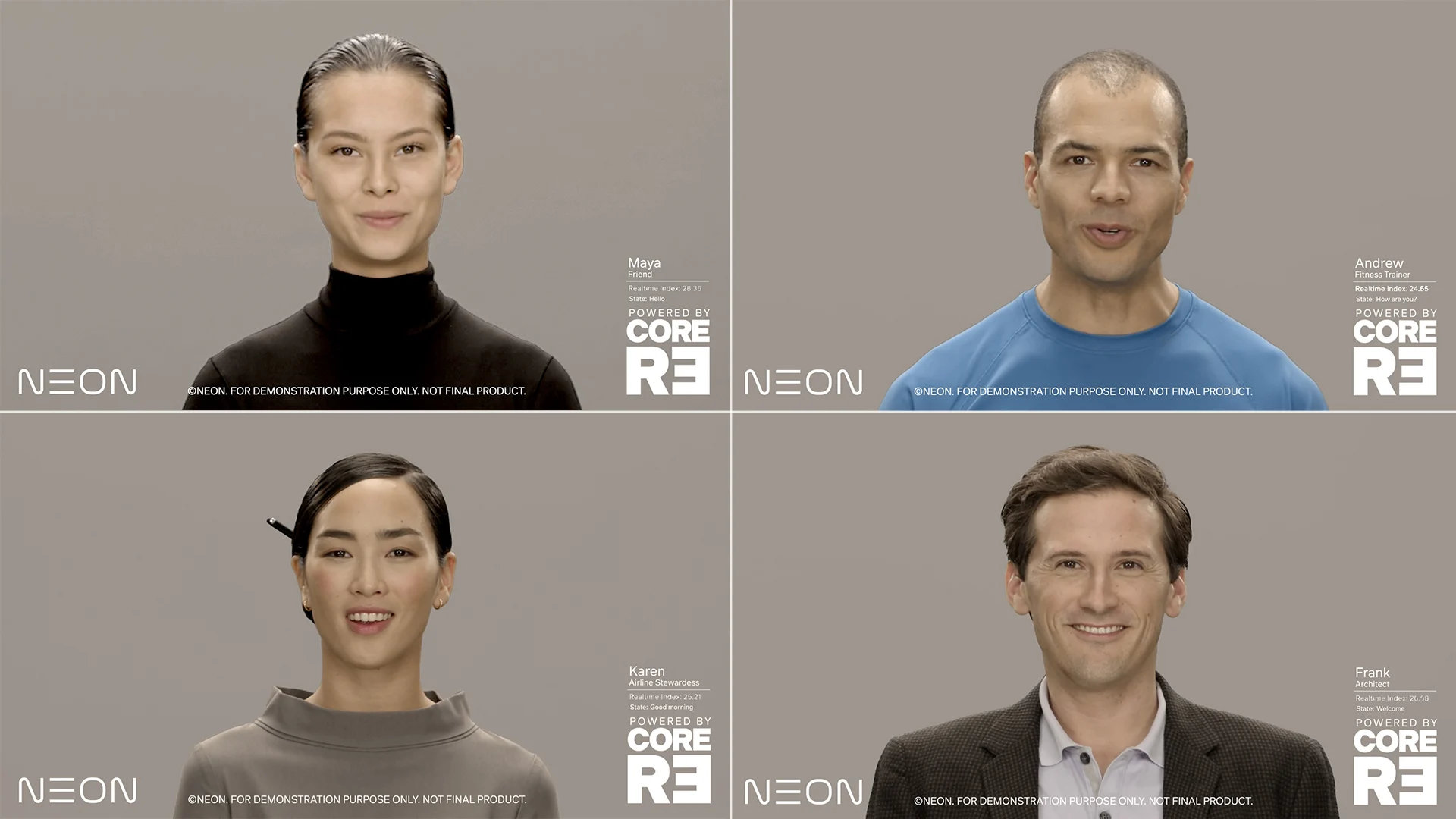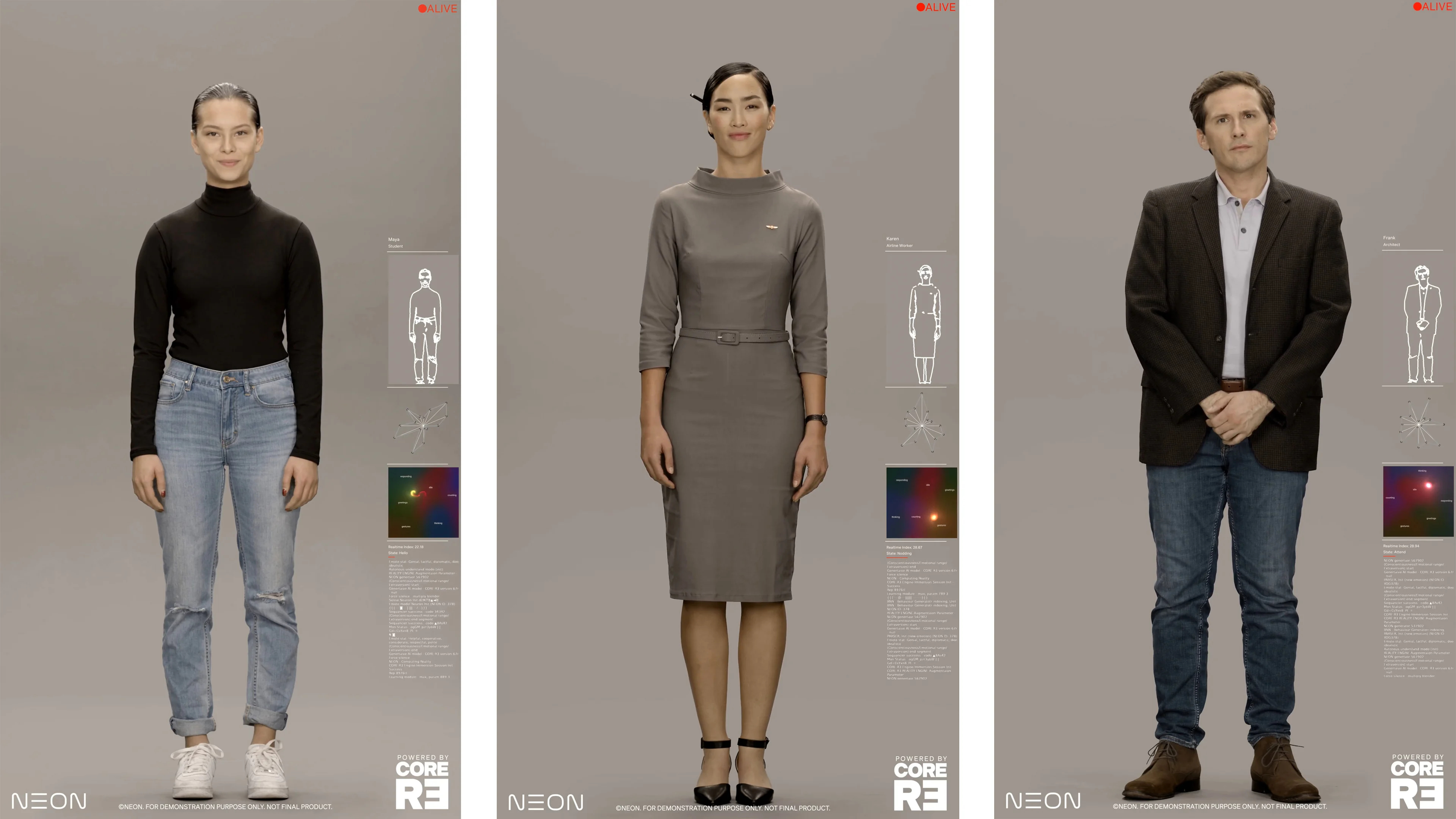❤ Samsung’s artificial human NEON to be showcased on Galaxy devices December 2020
Samsung had first unveiled its lifelike artificial humans called NEON earlier this year during CES 2020. Since then, the company has showcased several use cases, including in the banking, news, and retail sectors. Now, the company is hinting that we might get to see NEON on smartphones really soon.
Pranav Mistry, the CEO and President of STAR Labs, has mentioned on Twitter that he is currently using NEON on his smartphone. He also said that the company is testing its artificial humans on smartphones right now, and others can see it before Christmas. So, Samsung may showcase NEON on Galaxy smartphones sometime in December 2020.
There is no clear indication from Samsung if NEONs would one day come pre-installed on Galaxy devices and if they would be available on devices from other brands. NEONs are powered by STAR Labs’ Core R3 and SPECTRA technologies. SPECTRA offers emotions, intelligence, learning, and memory to Core R3, which Samsung claims can pass the Turing test once it is ready.
NEONs feature AI-generated virtual avatars that are indistinguishable from human beings, and each one of them has his/her own unique personality. Samsung’s website mentions that the artificial humans can be customized as per the client’s requirement. They can be used as a service representative, financial advisor, concierge, healthcare provider, or just as a virtual friend.
Disappointingly, what has been confirmed via The Verge and through the official teaser images is that the scenarios shown at CES and in promotional content ‘are fictionalized and simulated for illustrative purposes only.’ This likely means that the recently leaked NEON video doesn’t give us much of an insight into what STAR Labs’ ‘artificial human’ is all about or how these avatars will look like. The people shown in that video (and the images below) were actual actors and weren’t computer-generated images or the real ‘NEONs’ as the company calls its virtual avatars.
Samsung NEON will bring lifelike ‘artificial humans’ to your digital screens
It seems Samsung has found a way to bring lifelike ‘artificial humans’ to the masses. The company has been teasing a new product called NEON in recent weeks, and a leaked video showcasing what NEON can do suggests that we could soon be talking to a digital human who looks, talks, and even thinks like a real person.
NEON seems to use motion capture technology to capture an actor’s likeness and voice and then lets AI use that data to let the digital avatars “autonomously create new expressions, new movements, new dialog (even in Hindi), completely different from the original captured data”, according to Pranav Mistry, who is leading the project. Digital humans are not new – they have been seen in movies and video games for decades, but Samsung is suggesting that NEON can take things a step further and enable these digital humans to have unscripted interactions.
NEONs can’t be exact copies of an existing human being. They can share some similarities with humans but a NEON will never be an exact replica. The company claims that ‘each NEON is a unique, individual artificial human, with his/her own unique personality, just like us.’
NEON is a hype vector for now
Checking the official NEON webpage might get you all hyped for the future, but that seems to be by design. However, you don’t need an overly-critical eye to realize that there’s barely any concrete information there. The webpage is filled with buzz phrases such as ‘Inspired by the rhythmic complexities of nature‘ or ‘Virtually, Real. 100% visually real, like you and me. Existing among us from all walks of life.’
The most ambitious statement of all might be that the so-called NEONs are indistinguishable from real humans. ‘Introducing lifelike reality that is beyond our normal perception to distinguish.’ In other words, NEONs can easily pass the Turing test, according to STAR Labs, and that is quite a bold statement to make for a product that, so far, has only been ‘fictionalized and simulated for illustrative purposes only.’
But who knows?! Maybe this really is the beginning of a new era and we will be truly impressed once NEON will be ready for the masses. It’s just that, for now, STAR Labs hasn’t given us enough information to sell us on this rather confusing non-assistant AI concept. For the time being, it looks like NEON is a vision of a future enhanced by AI and powered mostly by hype.
A look at what the NEON artificial human could become
NEONs are supposed to show emotions and intelligence, with each avatar being customizable for different tasks. In STAR Labs’ vision ‘In the near future, one will be able to license or subscribe to a NEON as a service representative, a financial advisor, a healthcare provider, or a concierge. Over time, NEONs will work as TV anchors, spokespeople, or movie actors; or they can simply be companions and friends.’
Idealistically, NEONs are life-like computer-generated AI avatars indistinguishable from human beings. Exactly how they would reach the consumer market is unclear. We don’t know if they will be streamed to your smart devices from the cloud or if they would require prospective customers to purchase special local hardware.
They are, however, powered by STAR Labs’ Core R3 and SPECTRA technologies which remain somewhat of a mystery. But in short, Core R3 is a proprietary technology that can computationally create lifelike reality, while SPECTRA is an upcoming tech that will lend Intelligence, Learning, Emotions, and Memory to Core R3, according to the company. So, SPECTRA – the brain of the AI if you will – is not yet ready, but the company was confident enough to claim that it (together with Core R3) can pass the Turing test.
NEON beta is planned for release by the end of 2020
STAR Labs claims that NEON is ‘fundamentally different from deepfake or other facial reanimation techniques.’ What NEON isn’t, according to STAR Labs, is an AI assistant. It’s not an interface to the internet, not a music player. It’s ‘simply, a friend‘ and it can ‘speak it all, from Spanish to Hindi, from Japanese to English.’ NEON artificial humans are ‘more like us, an independent but virtual living being.’ Just how independent a NEON can be? We don’t know, but we might find out later this year.
It sounds like the technology is not yet ready for deployment and we don’t have a concrete launch date for the time being, but STAR Labs plans to release a beta version of NEON through select partners by the end of 2020.







